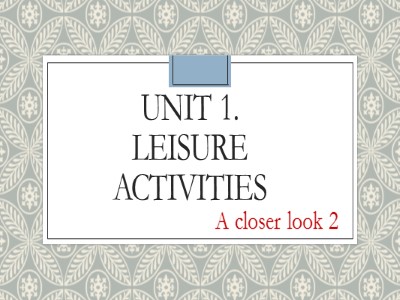Bài giảng môn Tiếng anh Lớp 8 - Unit 1, Lesson 3: A Closer Look 2

Adore (v) /əˈdɔː(r)/ : yêu thích, quý mến, thương
Fancy (v) /ˈfænsi/ : thích, mến
Don’t mind : không phiền
Dislike (v) /dɪsˈlaɪk/ : không thích
Detest (v) /dɪˈtest/ : ghét (cay ghét đắng)
We must use Gerund or To V(bare) after verbs of liking
Some verbs such as like, love, hate, prefer etc. can be used with both Gerund or To V(bare) without much change in meaning
Ex: I hate doing homework.
I hate to do homework.
After prepositions: in, on, at, into, out, under, with, without, within, by, of, beside, for, from, after, before, about, etc.
Ex: He left home without saying anything.
They earn their living by drawing pictures.
Bạn đang xem tài liệu "Bài giảng môn Tiếng anh Lớp 8 - Unit 1, Lesson 3: A Closer Look 2", để tải tài liệu gốc về máy bạn click vào nút DOWNLOAD ở trên
Unit 1. Leisure activitiesA closer look 2Adore (v) /əˈdɔː(r)/ : yêu thích, quý mến, thươngFancy (v) /ˈfænsi/ : thích, mếnDon’t mind : không phiềnDislike (v) /dɪsˈlaɪk/ : không thíchDetest (v) /dɪˈtest/ : ghét (cay ghét đắng)Pre-stageTask 1. Read and underlineWhile-stageWe must use Gerund or To V(bare) after verbs of likingSome verbs such as like, love, hate, prefer etc. can be used with both Gerund or To V(bare) without much change in meaning Ex: I hate doing homework. I hate to do homework.GERUNDAfter prepositions: in, on, at, into, out, under, with, without, within, by, of, beside, for, from, after, before, about, etc.Ex: He left home without saying anything. They earn their living by drawing pictures.2. After some words: a, verbs of liking: enjoy, love, like, adore, fancy, hate, detest, mind, prefer, etc. Ex: He adores playing the piano. b, avoid (tránh), miss (lỡ), suggest (gợi ý), consider (xem xét), keep (on) (tiếp tục, giữ), admit (thú nhận), deny (từ chối), intend (dự định), spend (để dành, chi), escape (thoát khỏi), imagine (tưởng tượng) Ex: He always avoids making noise in class.GERUND2. After some words: c, be + busy/worth Ex: He is busy playing with his son. This book is worth readingGERUNDGERUND3. After phrasal verbs: be accustomed to (quen với), look forward to (trông đợi), etc. Ex: I look forward to hearing from you. He is not accustomed to living in a small house. They re responsible of keeping the books safely. Was your mom famous for cooking Vietnamese food?GERUND4. After verbal phrases with “to have”:- To have difficulty / trouble / problem / a hard time / an easy timeEx: He has difficulty solving this issue.To have fun:Ex: We had fun working together.5. After some phrases:It’s no good: không tốt, chẳng đángIt’s no use: vô íchCan’t help, can’t resist: không khỏi, không thể kháng cựCan’t stand, can’t bear: không thể chịu nổiA waste of time/money: lãng phí thời gian/tiềnEx: It’s no use talking to him. I can’t stand staying here anymore. It’s a waste of time reading that book.GERUND6. After some express with “there + to be”There + to be (+no) Ex: There is talking in class. There was no cheating.GERUNDWhile-stageFollowed by Gerund onlyFollowed by both gerund and to-infinitive1. Love2. Enjoy 3. Detest 4. Prefer5. fancyTask 2. TickWhile-stageTask 3. Write the correct form of the verbsMai enjoys (make) crafts, especially bracelets.People in Britain love . (watch) TV in their free time.Do you fancy (skateboard) in the park this Sunday?Nick likes (learn) Vietnamese.Ngoc hates (sit) at the computer for too longmakingwatching / to watchskateboardinglearning / to learnsitting / to sitWhile-stageTask 5. Read the email a, Find the grammar mistake and correct Hi, my name’s Duc.How are you? This is what I like do in my free time. I often play video games or watch TV. Or I go to the park and play football with my friends. I enjoy do this very much! I sometimes help my parents too. If I have homework, I’ll try to finish it first before I do anything else. But I don’t like have lots of homework ☹! I don’t mind to do homework but I hate spend all evening on it! On Saturday or Sunday, I love eat out with my family. The food is delicious!What about you?Best, DucTask 5. Read the email b, Answer the questionsHow many activities does Duc mention in the email?Which two activities do you think he enjoy the most?While-stage He mentions 7 activities. They are: playing video games, watching TV, going to the park, playing football, helping his parents, doing homework, and eating out with his family. The two activities he enjoys the most are playing football with his friends, and eating out with his family Post-stageTask 4. Write sentencesI adore .I love .I fancy .I don’t mind .I don’t like .I detest .HomeworkTask 6. Write a similar email to tell your friend about your free time, using the verbs of liking + gerunds or verbs of liking + to-infinitives. Swap your work with a partner and check for mistakes.
Tài liệu đính kèm:
 bai_giang_mon_tieng_anh_lop_8_unit_1_lesson_3_a_closer_look.pptx
bai_giang_mon_tieng_anh_lop_8_unit_1_lesson_3_a_closer_look.pptx



